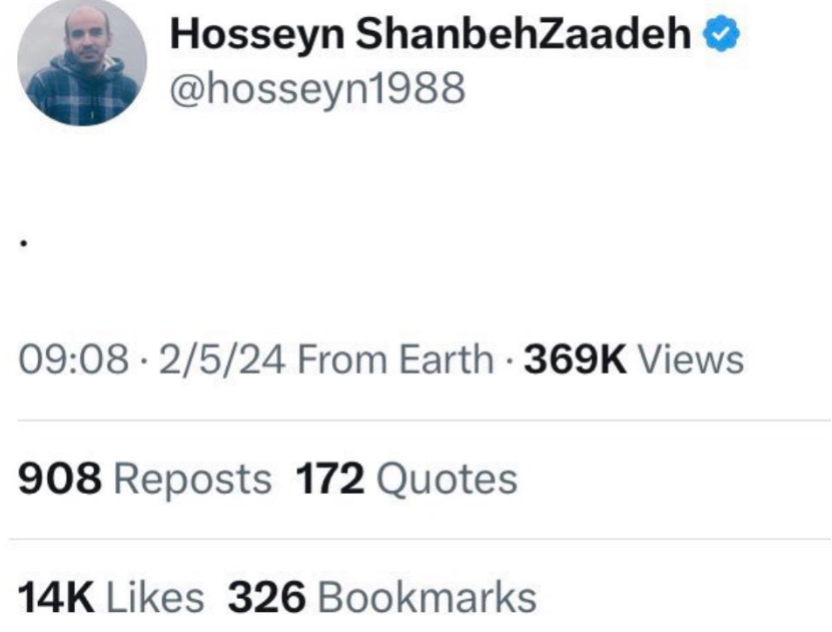A punctuation mark landed this guy in prison
For most of the world, the period is a “full stop.” Maybe that’s why this one-character tweet earned the wrath of the supreme leader.
Ayatollah Ali Khamenei, Iran’s supreme leader, posted on X a picture and short caption of the national volleyball team. An activist named Hossein Shanbehzadeh replied with a single mark: a period, or as the world outside North America calls it, a full stop.
Shanbehzadeh’s dot received twice as many likes as Khamenei’s. Shortly afterward, Shanbehzadeh was sentenced to 12 years in prison. The Voice of America contacted the prosecutor’s office, which claimed that the 35-year-old had been in touch with Israeli intelligence and then tried to flee the country. But just about everyone else credits the dot.
Ever since Aristophanes of Byzantium, head librarian of the library at Alexandria, invented that punctuation mark (along with the comma and colon) 22 centuries ago, the full stop has borne the power of significant silence. The Israeli linguist Michel Ephratt writes in the Journal of Pragmatics that “[Eloquent] silence, as a linguistic sign, conveys information in the referential function (zero-sign and passive constructions); it is an iconic affective way of expressing emotions (e.g., emptiness, intimacy) in the emotive function.” The philosopher Thomas Carlyle put it more succinctly back in the nineteenth century:
Silence is more eloquent than words.
While “full stop” seems an apt name for the sentence-ending dot, “period” has a richer meaning. The word first seems to have been applied to the punctuation mark in 1582, in an English book on grammar. And for good reason. In ancient Greek, periodos (περίοδος) meant a “going round” or “cycle.” Writers and orators strove to create a balanced, “rounded” sentence with a compelling rhythm.
But wait, there’s more. The ancients believed that the brain follows the rhythms of the rest of the body. A skilled orator’s most memorable period would last the length of a full breath, and the audience would grasp that period as a single thought or concept.
Do the math:
One breath’s worth of words equals one memorable thought. Some years ago, I went online and timed the climax of dozens of political and movie speeches. Each show-stopping period lasted an average of 12 seconds, or 40 words. Since then, I’ve encouraged students to write 40 words even before they outline an essay. Rewrite those words a bunch of times, and then make the rest of the essay support those words.
Here's a video I made back then that explains what I’m talking about.
OK, so what happens when your period contains comprises nothing but the punctuation mark, without the 40 words? In rhetoric, we’d call Shanbehzadeh’s punctuated protest a “gesture,” like flipping the bird or giving one’s beloved a diamond ring: pure meaning without words. The single dot may say, “I HAVE no words.” It qualifies as a virtual sit-down strike.
Or maybe what triggered the ayatollah’s outrage was the online response—thousands of likes and a jillion comments. In which case, the dot became an effective argumentum ad populum, or argument from popular opinion. In formal logic, that’s a fallacy. In rhetoric, well, look at all the influencers.
The period might make a great protest against just about anything we hate on X. (Which, in my case, is just about anything on X.)
Who wants to try it?






Interesting. In Hebrew, "neshama" means both breath, and soul. In Judaism, a newborn baby is considered to have a soul only when it takes its first breath. That's when it becomes a human being. The word "ruach" also means breath, wind or spirit. Breath and spirit are interconnected in Hebrew.
“I have no words,” as you said, or maybe, "Stop."
It's funny to me that a word that started with from the same root as periodic, meaning recurring, is now often used to designate a definitive end to their point, like saying (instead of doing) "Mic drop." E.g., "We're going to win this election. Period." That's quite the opposite meaning.
I often wonder how much the etymology matters in cases like this. If people don't know the origin of a word, does it still imply those ancient meanings? Or, in the case of "period," where we still also use the original meaning, "The orbital period of the moon is about 30 days," does that definition or connotation creep into the consciousness (or subconsciousness) when someone uses the other meaning?